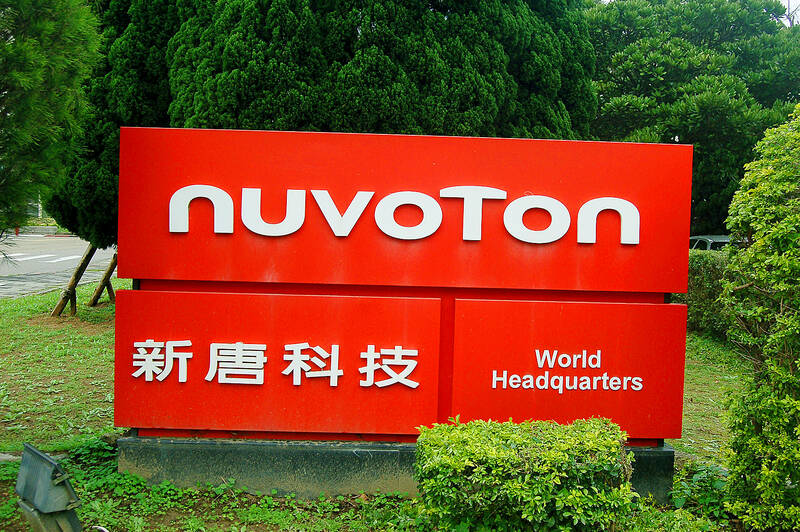Nuvoton Technology Corp (新唐科技), a microcontroller unit (MCU) maker, yesterday said it has vague order visibility, as macroeconomic uncertainty and ongoing inventory digestion have kept most customers on the sidelines.
Nuvoton became cautious about giving its gross margin outlook due to price competition and slower-than-expected recovery, Nuvoton chairman Su Yuan-mou (蘇源茂) told an investors’ conference yesterday.
“We have to make great efforts to keep the gross margin at 40 percent this year… Market demand is recovering at a slower rate than we thought. Besides, there is a competition factor to consider,” Su said. “I will be more optimistic about next year and the year after as our Japanese subsidiary is improving its costs.”

Photo: Grace Hung, Taipei Times
Nuvoton could miss its estimate from three months ago that gross margin would hit the bottom in the first quarter, and rebound after costs reductions and new product launches.
Nuvoton saw its gross margin hold steady at 40 percent last quarter, following three quarters of decline from 44 percent in the first quarter of last year.
Nuvoton is 51 percent owned by Winbond Electronics Corp (華邦電).
In response to a question about price pressure from Chinese competitors, Su said the company does not engage in the market share battle in China, as it focuses on supplying high-quality and high-performance chips — a different segment from its Chinese counterparts.
The company does not directly compete with Chinese MCU providers, as it has shifted its focus to supply MCUs used in industrial devices from consumer electronics, Su added.
The MCUs used in industrial devices and vehicles accounted for 50 percent of the company’s total revenue last quarter, up from 44 percent a quarter earlier, the company said.
New battery management ICs made at its Japanese fab would see growth, Su said, adding that MCUs used in vehicles and industrial devices would outperform chips used in consumer electronics such as smartphones and computers.
However, the company is monitoring whether the automotive supply chain would start adjusting inventory later this year as chip supply constraints have eased, Su said.

Taiwan Semiconductor Manufacturing Co (TSMC, 台積電) yesterday said that its investment plan in Arizona is going according to schedule, following a local media report claiming that the company is planning to break ground on its third wafer fab in the US in June. In a statement, TSMC said it does not comment on market speculation, but that its investments in Arizona are proceeding well. TSMC is investing more than US$65 billion in Arizona to build three advanced wafer fabs. The first one has started production using the 4-nanometer (nm) process, while the second one would start mass production using the

When an apartment comes up for rent in Germany’s big cities, hundreds of prospective tenants often queue down the street to view it, but the acute shortage of affordable housing is getting scant attention ahead of today’s snap general election. “Housing is one of the main problems for people, but nobody talks about it, nobody takes it seriously,” said Andreas Ibel, president of Build Europe, an association representing housing developers. Migration and the sluggish economy top the list of voters’ concerns, but analysts say housing policy fails to break through as returns on investment take time to register, making the

‘SILVER LINING’: Although the news caused TSMC to fall on the local market, an analyst said that as tariffs are not set to go into effect until April, there is still time for negotiations US President Donald Trump on Tuesday said that he would likely impose tariffs on semiconductor, automobile and pharmaceutical imports of about 25 percent, with an announcement coming as soon as April 2 in a move that would represent a dramatic widening of the US leader’s trade war. “I probably will tell you that on April 2, but it’ll be in the neighborhood of 25 percent,” Trump told reporters at his Mar-a-Lago club when asked about his plan for auto tariffs. Asked about similar levies on pharmaceutical drugs and semiconductors, the president said that “it’ll be 25 percent and higher, and it’ll

CHIP BOOM: Revenue for the semiconductor industry is set to reach US$1 trillion by 2032, opening up opportunities for the chip pacakging and testing company, it said ASE Technology Holding Co (日月光投控), the world’s largest provider of outsourced semiconductor assembly and test (OSAT) services, yesterday launched a new advanced manufacturing facility in Penang, Malaysia, aiming to meet growing demand for emerging technologies such as generative artificial intelligence (AI) applications. The US$300 million facility is a critical step in expanding ASE’s global footprint, offering an alternative for customers from the US, Europe, Japan, South Korea and China to assemble and test chips outside of Taiwan amid efforts to diversify supply chains. The plant, the company’s fifth in Malaysia, is part of a strategic expansion plan that would more than triple